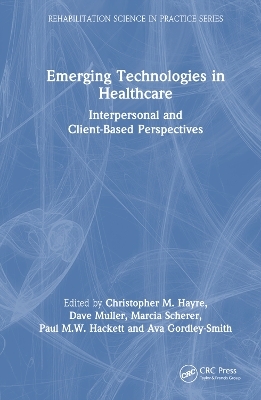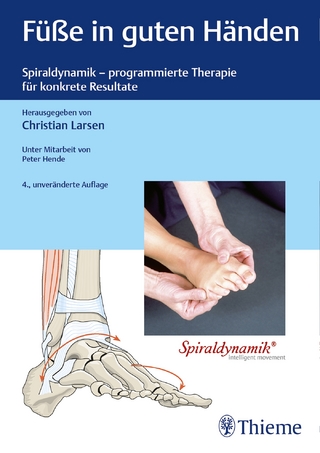
Emerging Technologies in Healthcare
CRC Press (Verlag)
978-1-032-21578-5 (ISBN)
This edited book focuses on the role and use of emerging technologies within the healthcare sector. This text draws on expertise from leading practitioners and researchers who either utilize and/or are at the forefront of researching with emerging technology in anticipation of enhancing patient outcomes.
Emerging Technologies in Healthcare: Interpersonal and Client-Based Perspectives focuses on the role of emerging technologies in society and how it may enhance medical treatment, management, and rehabilitation of service users. It offers expert perspectives on topics covering emerging technological advances and how they are being incorporated into healthcare, but also critically appraises forthcoming implementation. The editors draw from recent publications and the growing narrative surrounding technological advances, notably telerehabilitation, virtual reality, augmentation, and mHealth. Subsequent chapters focus on these, coupled with other emerging technologies, providing detailed insight into how these can either enhance and/or hinder patient/service user outcomes. Each chapter explores the multifaceted use and application of each emerging technology, that impacts on diagnosis, treatment, and (self-) management of individuals. For example, can emerging technology really facilitate patient diagnosis, improve, or remove practitioner–patient interactions, provide sound rehabilitation, and treat/monitor mental health conditions?
This edited volume encompasses an array of emerging technologies that will remain pertinent to caregivers, families, practitioners, service users and policymakers. This is not a text on emerging technology alone but on its societal implications, accompanied by ethical, altruistic, and moral examples for such advances within the healthcare field. It is targeted that this text will enhance and offer original discussions surrounding the interconnectivity of technology and medicine, rehabilitation, and patient care.
Dr. Christopher Hayre is the current Programme Director and Senior Lecturer in Medical Imaging at the University of Exeter, United Kingdom. He has published over 70 refereed papers in the field of medical imaging, medical anthropology and emerging/disruptive technologies. This is supported with the development of several books with colleagues worldwide. He is also the founding and current Editor to a book series with CRC Press, titled: Medical Imaging in Practice. Professor Dave Muller is currently the Editor of the CRC series with Professor Marcia Scherer on Rehabilitation Science in Practice. He was the founder Editor of the Journal Aphasiology and is currently Editor in Chief of the Journal Disability and Rehabilitation. He has published over forty refereed papers and has been involved either as Series Editor, Editor, or author of over fifty books. He is a visiting Professor at the University of Suffolk, United Kingdom. Professor Marica Scherer is a rehabilitation psychologist and founding President of the Institute for Matching Person & Technology. She is also a Professor of Physical Medicine and Rehabilitation at, University of Rochester Medical Center where she received both her Ph.D. and MPH degrees. She is a past member of the National Advisory Board on Medical Rehabilitation Research, National Institutes of Health, and is Editor of the journal Disability and Rehabilitation: Assistive Technology. She is Co-Editor of the book series for CRC Press, Rehabilitation Science in Practice Series. Dr. Scherer is a Fellow of the American Psychological Association, American Congress of Rehabilitation Medicine, and the Rehabilitation Engineering and Assistive Technology Society of North America (RESNA). Dr. Scherer has authored, edited, or co-edited nine book titles and has published over 80 articles in peer-reviewed journals, 50 published proceedings papers, and 30 book chapters on disability and technology. Her research has been cited more than 5000 times by others. Paul Hackett is the originator and developer of the Declarative mapping Approach to social researcher and the Declarative Mapping Sentence (DMS) for guiding and interpreting qualitative and philosophical research enquiries. In my research and publications, I consider the use of categorial ontologies/mereologies in the understanding of behaviour and experience. Most recently I have focussed upon the perception and understanding of abstract fine art and avian behaviour and cognition. In Facet Theory and the Mapping Sentence: Evolving Philosophy, Use and Application I look at the development of facet theory viewing philosophical/ psychological categorisation using a mapping sentence. I hold professorial appointments at the University of Suffolk, UK, Nnamdi Azikiwe University Nigeria and teach and supervise at the University of Wales Trinity St David, and Emerson College. I have approximately 300 publications which include 30 books. I hold a PhD in both psychology and fine art.
1 Emerging Technologies in Healthcare: Interpersonal and Client-Based Perspectives 2 Augmentation through Technology: Considerations for Choice, Identity, and Culture 3 Emerging Technologies in Healthcare: Disability-Related Perspectives from Ghana 4 Emerging Technologies in Neurorehabilitation: A Perspective from Brazil 5 Virtual Reality and Magnetic Resonance Imaging of Anxious or Claustrophobic Patients: An Emerging Solution to a Longstanding Challenge? 6 Ethical and Moral Considerations: Telerehabilitation 7 Technology-aided Programs to Support Leisure, Communication, and Daily Activities in People with Intellectual and Multiple Disabilities 8 The Role of Healthcare and Social Care Professionals in Supporting Access to and Engagement with Healthcare Technologies 9 Video Modeling: Opportunities and Ethical Considerations 10 The Explosion of Technology in Pediatric Rehabilitation: A Call to Use the F-Word Lens 11 Opportunities to Reduce Inequities through Tele-wheelchair Assessments: The Importance of Co-designing Services with indigenous Māori with Lived Experience of Disability 12 Person-centered Perspective on the Use of Technology in Healthcare 13 Technology in the Home: An Ethical Discussion about Aging Adults with Cognitive Changes 14 Determining the Role of Socially Assistive Robots in Healthcare
| Erscheinungsdatum | 09.04.2024 |
|---|---|
| Reihe/Serie | Rehabilitation Science in Practice Series |
| Zusatzinfo | 29 Halftones, color; 6 Halftones, black and white; 29 Illustrations, color; 6 Illustrations, black and white |
| Verlagsort | London |
| Sprache | englisch |
| Maße | 156 x 234 mm |
| Gewicht | 620 g |
| Themenwelt | Schulbuch / Wörterbuch |
| Medizin / Pharmazie ► Gesundheitswesen | |
| Medizin / Pharmazie ► Physiotherapie / Ergotherapie ► Orthopädie | |
| Naturwissenschaften ► Biologie | |
| Technik ► Medizintechnik | |
| Wirtschaft ► Volkswirtschaftslehre | |
| ISBN-10 | 1-032-21578-X / 103221578X |
| ISBN-13 | 978-1-032-21578-5 / 9781032215785 |
| Zustand | Neuware |
| Haben Sie eine Frage zum Produkt? |
aus dem Bereich


